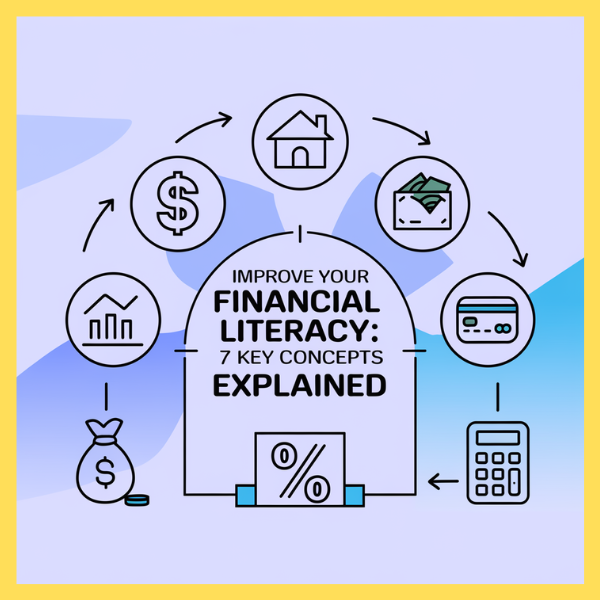Financial literacy is a critical skill that empowers individuals to make informed and effective decisions with their financial resources. By understanding key financial concepts, you can take control of your finances, plan for the future, and achieve your financial goals. In this comprehensive guide, we will explore seven essential concepts that are fundamental to improving your financial literacy.
1. Budgeting
Budgeting is the process of creating a plan to manage your income and expenses. It helps you track where your money is going and ensures that you are living within your means. A well-structured budget allows you to allocate funds for necessities, savings, and discretionary spending.
Key Components of Budgeting:
- Income: List all sources of income, including salary, freelance work, investments, and any other earnings.
- Expenses: Categorize your expenses into fixed (e.g., rent, mortgage) and variable (e.g., groceries, entertainment) costs.
- Savings: Allocate a portion of your income towards savings and emergency funds.
- Debt Repayment: Plan for paying off any outstanding debts, prioritizing high-interest debts first.
Budgeting Tips:
- Use the 50/30/20 Rule: Allocate 50% of your income to needs, 30% to wants, and 20% to savings and debt repayment.
- Track Your Spending: Use budgeting apps or spreadsheets to monitor your spending in real-time.
- Review and Adjust: Regularly review your budget and make adjustments as needed to stay on track.
2. Saving and Emergency Funds
Saving is the practice of setting aside money for future use. Having a robust savings plan is essential for financial stability and achieving long-term goals. An emergency fund is a specific type of savings that provides a financial safety net during unexpected events, such as medical emergencies, job loss, or major repairs.
Benefits of Saving:
- Financial Security: Savings provide a buffer against financial shocks and uncertainties.
- Goal Achievement: Saving helps you achieve financial goals, such as buying a home, funding education, or planning for retirement.
- Debt Avoidance: An emergency fund can prevent you from relying on credit cards or loans during emergencies.
Saving Tips:
- Set Clear Goals: Define specific savings goals, such as an emergency fund, vacation fund, or down payment for a home.
- Automate Savings: Set up automatic transfers to your savings account to ensure consistent contributions.
- Open a High-Yield Savings Account: Consider a high-yield savings account to earn more interest on your savings.
3. Investing
Investing is the act of allocating money to assets or ventures with the expectation of generating a return. Investing is a key component of building wealth and achieving long-term financial goals. Common investment options include stocks, bonds, real estate, and mutual funds.
Types of Investments:
- Stocks: Shares of ownership in a company that can appreciate in value and pay dividends.
- Bonds: Debt securities issued by governments or corporations that pay periodic interest and return the principal at maturity.
- Real Estate: Property investments that can generate rental income and appreciate in value.
- Mutual Funds and ETFs: Pooled investment vehicles that diversify across multiple assets.
Investing Tips:
- Diversify Your Portfolio: Spread your investments across different asset classes to reduce risk.
- Understand Risk Tolerance: Assess your risk tolerance and choose investments that align with your financial goals and comfort level.
- Stay Informed: Keep up with market trends and financial news to make informed investment decisions.
4. Credit and Debt Management
Credit and debt management are crucial aspects of financial literacy. Understanding how to use credit responsibly and manage debt effectively can improve your financial health and access to favorable loan terms.
Types of Credit:
- Credit Cards: Revolving credit accounts that allow you to borrow up to a certain limit and pay interest on unpaid balances.
- Loans: Fixed-term credit accounts, such as mortgages, auto loans, and personal loans, that require regular payments over a specified period.
Debt Management Strategies:
- Prioritize High-Interest Debt: Focus on paying off high-interest debt, such as credit card balances, first.
- Consider Debt Consolidation: Combine multiple debts into a single loan with a lower interest rate to simplify payments and reduce overall interest.
- Avoid Unnecessary Borrowing: Limit the use of credit cards and avoid taking on new debt unless necessary.
Credit Score Tips:
- Make Timely Payments: Ensure that all payments are made on time to maintain a good credit score.
- Monitor Your Credit Report: Regularly check your credit report for accuracy and address any errors or fraudulent activity.
- Keep Credit Utilization Low: Aim to keep your credit utilization ratio below 30% of your available credit limit.
5. Retirement Planning
Retirement planning involves setting financial goals and strategies to ensure that you have sufficient income during your retirement years. A well-thought-out retirement plan provides financial security and peace of mind in your later years.
Retirement Savings Options:
- 401(k) and 403(b) Plans: Employer-sponsored retirement plans that allow you to contribute pre-tax income and may include employer matching contributions.
- Individual Retirement Accounts (IRAs): Tax-advantaged accounts, such as Traditional IRAs and Roth IRAs, that allow you to save for retirement.
- Pension Plans: Employer-sponsored defined benefit plans that provide a fixed monthly income during retirement.
Retirement Planning Tips:
- Start Early: Begin saving for retirement as early as possible to take advantage of compound interest.
- Contribute Regularly: Make regular contributions to your retirement accounts and take advantage of employer matching contributions.
- Diversify Investments: Invest in a diversified portfolio to balance risk and growth potential.
6. Insurance
Insurance is a financial product that provides protection against potential financial losses. Having adequate insurance coverage is essential for managing risk and ensuring financial stability.
Types of Insurance:
- Health Insurance: Covers medical expenses and provides access to healthcare services.
- Life Insurance: Provides a death benefit to beneficiaries in the event of the policyholder’s death.
- Auto Insurance: Covers damages and liabilities related to vehicle accidents.
- Homeowners/Renters Insurance: Protects against property damage, theft, and liability for homeowners and renters.
Insurance Tips:
- Assess Coverage Needs: Evaluate your insurance needs based on your financial situation and potential risks.
- Shop Around: Compare insurance policies and premiums from different providers to find the best coverage and rates.
- Review Policies Regularly: Periodically review your insurance policies to ensure that they continue to meet your needs.
7. Tax Planning
Tax planning involves strategies to minimize tax liabilities and maximize after-tax income. Understanding tax laws and regulations can help you make informed financial decisions and optimize your tax situation.
Tax Planning Strategies:
- Take Advantage of Tax-Advantaged Accounts: Contribute to retirement accounts, health savings accounts (HSAs), and education savings accounts to benefit from tax advantages.
- Claim Deductions and Credits: Identify and claim eligible deductions and tax credits to reduce your taxable income and tax liability.
- Plan for Capital Gains: Strategically manage the timing of asset sales to minimize capital gains taxes.
Tax Planning Tips:
- Stay Informed: Keep up to date with changes in tax laws and regulations that may affect your financial situation.
- Keep Accurate Records: Maintain accurate records of income, expenses, and financial transactions to support your tax filings.
- Seek Professional Advice: Consult with a tax professional to develop a personalized tax planning strategy.
Final Thoughts
Improving your financial literacy is a vital step towards achieving financial stability and success. By understanding and applying these seven key concepts—budgeting, saving, investing, credit and debt management, retirement planning, insurance, and tax planning—you can take control of your financial future and make informed decisions that align with your goals. These expert insights provide a solid foundation for enhancing your financial knowledge and building a secure financial future.





